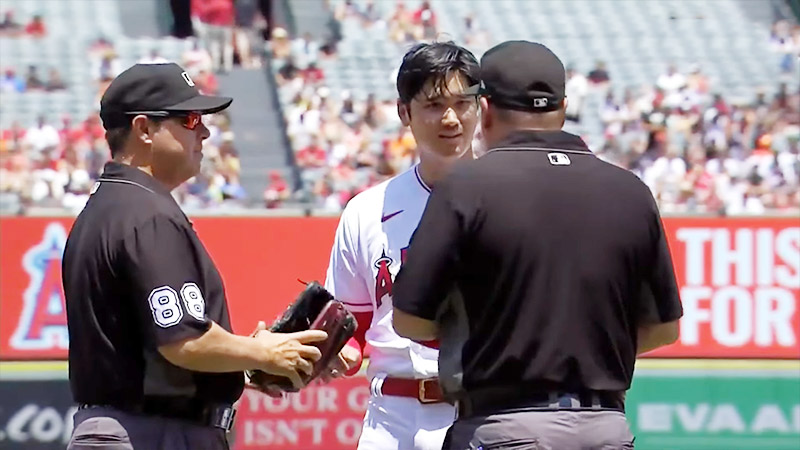In the dynamic world of Major League Baseball (MLB), the rules governing fair play are constantly evolving.
One aspect of this evolution involves the diligent inspection carried out by MLB umpires on pitchers’ hats and gloves.
This scrutiny is not merely a formality; it’s a pivotal element in maintaining the integrity of the game. As concerns surrounding the use of foreign substances by pitchers have grown, so has the importance of these checks.
This blog post aims to delve into do MLB umpires check pitchers’ hats and gloves.
From preventing unfair advantages to upholding the league’s standards, understanding the intricacies of these inspections provides valuable insights into the commitment of MLB to fair competition. So, stay sharp.
Do MLB Umpires Check Pitcher’s Hats and Gloves?
Major League Baseball (MLB) umpires primarily focus on inspecting pitchers for foreign substances on their person, including their hats and gloves, to ensure fair play.
In June 2021, MLB implemented stricter enforcement against the use of foreign substances by pitchers to maintain the integrity of the game.
Umpires have the authority to check pitchers’ hats, gloves, belts, and other parts of their uniform for any substances that could enhance the grip on the ball, providing an unfair advantage.
These checks are typically conducted during or after an inning and have become more routine to address concerns about the increased use of sticky substances.
Why Do Umpires Check Pitcher’s Hands: MLB Rules and Regulations
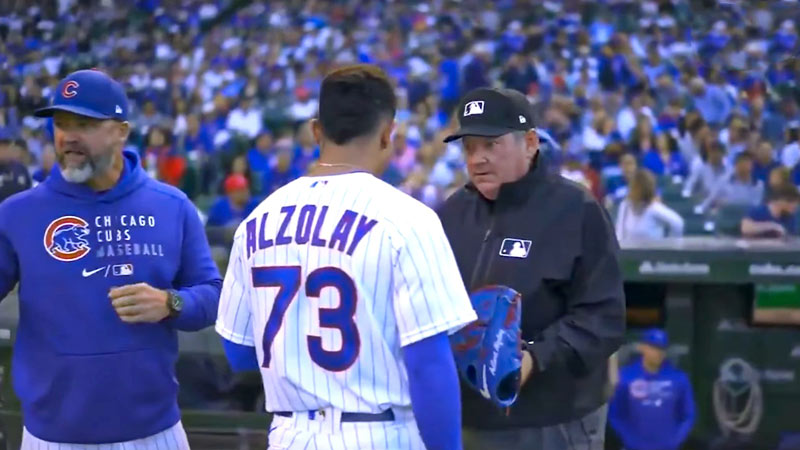
To learn exactly why does the umpire check pitchers hands, you should know the MLB rules. Only then you can get particularly what does the umpire checks the pitcher’s hand for.
In response to growing concerns about the use of foreign substances by pitchers to gain an unfair advantage, Major League Baseball (MLB) has implemented stricter rules and regulations.
Umpires now routinely check pitchers’ hands during games to uphold the integrity of the sport.
Ensuring Fair Play
The umpire checks pitchers’ hands to ensure that they do not apply foreign substances, such as sticky substances or any other illegal grips, which could impact the movement and control of the ball.
This rule is crucial in maintaining a level playing field among all teams and pitchers.
Preserving the Game’s Integrity
Regular checks on pitchers’ hands help preserve the integrity of the game by preventing the use of substances that may artificially enhance a pitcher’s performance.
The MLB is committed to fair competition, and these checks serve as a deterrent against any attempts to gain an unfair advantage.
Adherence to League Regulations
The checks align with MLB’s rules and regulations, emphasizing that pitchers must compete without the aid of substances that could compromise the natural characteristics of the baseball.
Umpires play a vital role in enforcing these regulations on the field.
Addressing Player and Fan Concerns
The implementation of hand checks responds to concerns raised by players, teams, and fans about the potential impact of foreign substances on the game.
By actively addressing these concerns, MLB aims to create a transparent and trustworthy environment for both players and fans.
Enhancing Game Flow
While the checks may briefly interrupt the flow of the game, they contribute to the overall efficiency by discouraging the use of foreign substances.
By doing so, MLB aims to maintain a pace of play that is fair, competitive, and enjoyable for all participants and spectators.
What Do the Umpires Check Pitchers Every Inning?
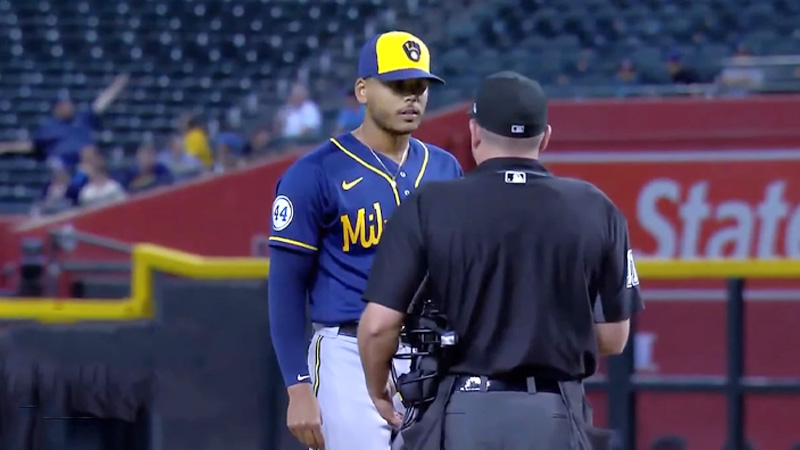
There are also people who don’t get Why do they check pitchers’ hands every inning.
In a bid to curb the use of foreign substances and maintain fair competition, Major League Baseball (MLB) umpires have adopted a more proactive approach by checking pitchers every inning.
This practice is designed to ensure compliance with league rules and regulations.
Consistent Vigilance
Umpires check pitchers every inning to maintain a consistent and vigilant approach throughout the game.
By conducting regular checks, they deter pitchers from attempting to apply foreign substances at any point during the match.
Preventing Mid-game Adjustments
Checking pitchers every inning prevents the possibility of mid-game adjustments.
By enforcing inspections consistently, umpires aim to discourage any attempts by pitchers to alter their approach or gain an unfair advantage as the game progresses.
Immediate Intervention
Regular checks provide umpires with the opportunity for immediate intervention if they observe any violations.
This ensures that any potential use of foreign substances is addressed promptly, maintaining the integrity of the game without allowing room for prolonged rule violations.
Sending a Strong Message
Conducting checks every inning sends a strong message to pitchers that the league is serious about enforcing the rules.
The consistent monitoring emphasizes the MLB’s commitment to fair play and serves as a deterrent against any attempts to circumvent the regulations.
Enhancing Transparency
Regular inspections contribute to the overall transparency of the game.
By checking pitchers every inning, MLB aims to demonstrate a commitment to fair competition and assure players, teams, and fans that the league is actively addressing concerns related to the use of foreign substances.
The Umpire’s Role in Equipment Inspection
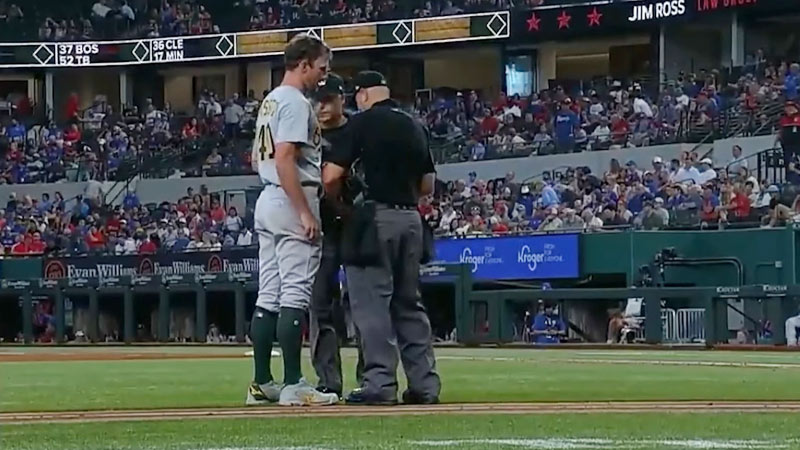
You should know the Umpire’s role in inspection to understand why does the umpire check the pitcher’s hands. Only then you can have a clear concept of What are umpires looking for in pitchers’ hands.
Umpires play a crucial role in maintaining the integrity of the game by actively participating in equipment inspections.
This responsibility involves ensuring that players adhere to league regulations regarding the use of legal and safe equipment.
Verification of Player Gear
Umpires are responsible for verifying that players are equipped with the proper and league-approved gear before the game begins.
This includes ensuring that players wear the correct uniforms, helmets, gloves, and other essential equipment.
Safety Compliance
Umpires inspect equipment to ensure that it complies with safety standards.
This includes checking for any damage or irregularities that could compromise the safety of the players. Ensuring that all equipment is in good condition is vital for preventing injuries during the game.
Preventing Unfair Advantages
Umpires scrutinize equipment to prevent players from gaining unfair advantages.
This involves checking for any illegal modifications or substances that could enhance performance, such as foreign substances on a pitcher’s glove or bat.
Adherence to League Rules
The umpire’s role in equipment inspection is aligned with league rules and regulations.
They enforce these rules consistently to create a level playing field and maintain the fairness and integrity of the game.
Timely Interventions
Umpires are empowered to intervene promptly if they identify any equipment violations during the game.
This proactive approach ensures that any issues are addressed immediately, preventing potential disruptions and upholding the standards set by the league.
Why Do Refs Check Pitcher’s Hands
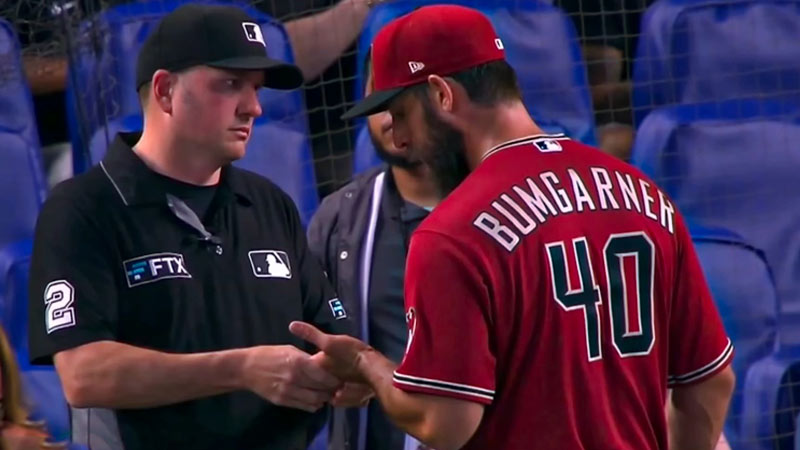
Some of you also don;t get it when referees are there then why does umpire check pitchers hands. Pitchers’ hands are subject to scrutiny by referees in various sports, including baseball, to ensure fair play and adherence to rules.
This practice serves several important purposes in maintaining the integrity of the game.
Preventing the Use of Foreign Substances
Referees check pitchers’ hands to prevent the application of foreign substances such as pine tar, sunscreen, or other tacky materials.
The use of these substances can alter the grip on the ball, providing an unfair advantage to the pitcher. Regular checks act as a deterrent against attempts to gain an edge through illegal means.
Upholding Game Rules
The primary role of referees is to enforce the rules of the game.
By inspecting pitchers’ hands, they ensure that players comply with league regulations regarding the use of substances and maintain a fair and competitive environment.
Maintaining Consistency
Referees conduct checks consistently to avoid selective enforcement.
By examining pitchers’ hands regularly, referees create a standardized approach that is applied uniformly to all players, regardless of team or individual performance.
Preserving the Integrity of Pitches
The condition of a pitcher’s hands can influence the natural movement and behavior of the ball during a pitch.
Referees inspect hands to safeguard the integrity of pitches, ensuring that the outcome of the game is determined by the players’ skill and strategy rather than external factors.
Addressing Concerns and Suspicion
Referees may check pitchers’ hands in response to concerns raised by opposing teams, players, or even based on their own observations.
This proactive approach helps address suspicions of rule violations and reinforces the referees’ commitment to fair play and sportsmanship.
FAQs
Do MLB umpires routinely check pitchers’ hats and gloves during games?
Yes, MLB umpires regularly inspect pitchers’ hats, gloves, and other equipment for foreign substances to ensure fair play.
These checks are part of the league’s efforts to maintain the integrity of the game and uphold pitching standards.
When do umpires typically check pitchers’ hats and gloves?
Umpires often conduct these checks during or after innings. The goal is to deter pitchers from using illegal substances that could affect the ball’s movement and to enforce rules consistently throughout the game.
Why are umpires concerned about foreign substances on pitchers’ hats and gloves?
Foreign substances on pitchers’ hats and gloves can alter the ball’s behavior, giving an unfair advantage.
Umpires aim to prevent any manipulation that could compromise the game’s integrity, ensuring a level playing field for all teams.
Can umpires check pitchers’ hats and gloves based on suspicion or specific incidents?
Yes, umpires have the authority to check pitchers’ hats and gloves based on suspicion, concerns raised by opposing teams, or specific incidents.
These checks may occur in response to observed behavior or as part of routine inspections to address potential rule violations.
How do these checks contribute to the overall integrity of MLB games?
By inspecting pitchers’ hats and gloves, MLB umpires deter the use of illegal substances, preserving the fairness and integrity of the game.
This proactive approach reinforces the league’s commitment to upholding rules and ensuring that outcomes are determined by skill and fair competition.
Wrapping Up
In the intricate dance of strikes, curves, and fastballs that define Major League Baseball, the meticulous checks conducted by umpires on pitchers’ hats and gloves emerge as a silent guardian of fairness and competition.
These inspections, far from being routine, serve as a shield against the encroachment of illegal advantages that could sway the balance of the game.
As we unravel the layers of this scrutiny, it becomes evident that the league’s commitment to upholding rules and maintaining a level playing field is unwavering.
The checks signify not just a practical measure but a statement—a declaration that the essence of the game lies in the prowess of the players, unaltered by external influences.
The constant evolution of these inspections mirrors MLB’s dedication to adapting and preserving the integrity that defines America’s favorite pastime. Thank you so much.

